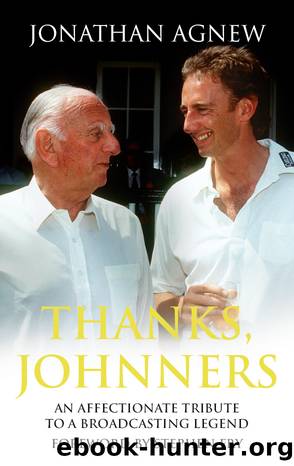Thanks, Johnners by Jonathan Agnew

Author:Jonathan Agnew
Language: eng
Format: epub
Publisher: HarperCollins Publishers
Chapter Six
Not Cricket
With his conversational style and natural ability to communicate, Brian Johnston was instrumental in broadening Test Match Special’s appeal when he joined the programme full-time in 1970. His recent sacking from the television commentary box had caused much rancour, and some personal embarrassment too, because he remained BBC cricket correspondent until he retired from the position on his sixtieth birthday in 1972. He was succeeded in that role by Christopher Martin-Jenkins, but since Johnners remained as the presenter of TMS – the front man, if you like – for the next twenty-one years, and had been involved with cricket for so long, his views on the game continued to carry great weight.
On Test Match Special all usually appears to be well with the world whatever the scoreboard might say to the contrary, and through cheerful banter and gentle leg-pulling we commentators do our best to convey the pleasures of watching and talking about cricket. Therefore it can come as quite a shock for listeners suddenly to hear the correspondent adopt a serious or outspoken position on a pressing cricketing issue. Some do not like it at all, and make their feelings strongly known by letter or, these days, email. But while Test Match Special prides itself on its bonhomie and good companionship, sometimes subjects do arise that are more important even than the quality of Mrs Arbuthnot’s lemon drizzle cake.
The role of correspondent has changed over the years, and now involves many additional demands. There are more radio stations, including the rolling news of Radio 5 Live, and there is also the twenty-four-hour BBC News Channel on television to service, as well as writing for the BBC website. I have a broadcasting circuit in my home, which means I can simply plug my headphones into a magic box and instantly appear on virtually any radio station in the world. It is all a far cry even from my early days in the job, when I would have to drive to the nearest local BBC Radio station and book a studio, and it certainly makes it more palatable to appear on early-morning breakfast radio. This is usually dealt with while I am still in my dressing gown and slippers, which might make one or two people think next time they hear me on the Today programme. The downside, of course, is that I am always on call, and am sometimes expected to broadcast almost instantly. This can often result in my sounding rather rushed when first put on air.
A good example of this was when the news broke of Andrew Flintoff’s latest knee injury, which he sustained while playing in South Africa shortly before the Ashes summer of 2009. I was enjoying a quiet lunch in the pub next door when my mobile phone rang. It was the BBC sports room in London, telling me that I was to be on air in ten minutes to give my reaction. I ran home and charged upstairs to my office. Having plugged in my equipment, I had about three minutes in which to compose my thoughts.
Download
This site does not store any files on its server. We only index and link to content provided by other sites. Please contact the content providers to delete copyright contents if any and email us, we'll remove relevant links or contents immediately.
Cecilia; Or, Memoirs of an Heiress — Volume 3 by Fanny Burney(30934)
Cecilia; Or, Memoirs of an Heiress — Volume 2 by Fanny Burney(30889)
Fanny Burney by Claire Harman(25784)
We're Going to Need More Wine by Gabrielle Union(18072)
Plagued by Fire by Paul Hendrickson(16635)
Cat's cradle by Kurt Vonnegut(13862)
Bombshells: Glamour Girls of a Lifetime by Sullivan Steve(13107)
All the Missing Girls by Megan Miranda(12746)
Leonardo da Vinci by Walter Isaacson(11901)
4 3 2 1: A Novel by Paul Auster(11045)
Adultolescence by Gabbie Hanna(8144)
The remains of the day by Kazuo Ishiguro(7550)
Note to Self by Connor Franta(7024)
Diary of a Player by Brad Paisley(6866)
Giovanni's Room by James Baldwin(5877)
What Does This Button Do? by Bruce Dickinson(5525)
Recovery by Russell Brand(4562)
Born a Crime by Trevor Noah(4510)
The Kite Runner by Khaled Hosseini(4430)
